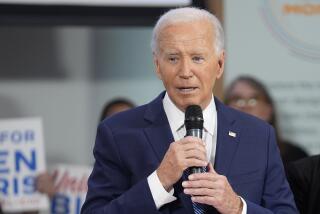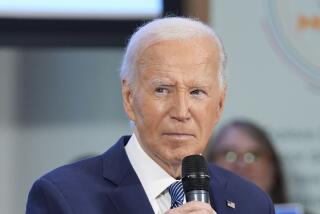The perfect candidate
If Americans have such a low opinion of politicians -- and they do -- why then do they invest so many hopes and expectations in one of them every four years?
Are they stupid? Naive? Like continually heartbroken but eternally hopeful lovers, do they really think their next suitor will not disappoint them like all the rest?
Try writing a newspaper column for a few weeks and, if you dare check your e-mail, you’ll get a whiff of how much people want to love, revere and believe in the perfection of the presidential candidate of their choice. Like loyal servants or younger siblings, they also want to protect their individual candidate from criticism. It strikes me as odd that the average Jane or Joe would spend so much energy trying to defend the powerful from their detractors, but I guess that’s precisely what makes them powerful in the first place.
Granted, the president is not just another politician. That office is the only one in the federal government that we all vote for. He or she is the only official responsible for and to all the people, and we expect him or her to be the embodiment of the good things we like to think about ourselves as a nation. Presidential candidates, therefore, position themselves not only as exemplary Americans but as exemplary human beings. As our estimation of politicians in general has sunk lower and lower, White House candidates have begun to portray themselves as outsiders, non-politicians, men and women who can promise not to tolerate business as usual in their chosen profession.
What shocks me, however, is that we actually fall for it.
Just hold on; I’m not saying that your candidate doesn’t have good ideas or intentions, nor am I peddling outright cynicism. But the practice of idealizing politicians, of putting presidents or any other elected official on a pedestal, is a little like repeatedly nominating a used-car salesman to the Better Business Bureau. How many Eliot Spitzers does it take before we stop being even a little bit surprised that these people are not only human, they’re wildly ambitious, which makes them especially prone to the big fall?
I used to think it was a shame that, at election time, I always feel obliged to choose between the lesser of two evils. But now I think it might be a blessing. Even the negative ads that pundits constantly complain about are a gift. As one Vanderbilt professor assures us, negative ads can often be more substantive (and accurate) than the goofy hagiographies that feature sunny images of the candidates and their happy families. In the best-case scenario, the mudslinging can help us see our own preferred candidate in three-dimensional terms.
“I think we should always pick the candidate whose failings are the least damaging,” Eric Alterman, author of “Why We’re Liberals: A Political Handbook for Post-Bush America,” told me. “Liberals in particular tend to pay too much attention to good intentions. It helps to know what’s wrong with these people.”
But Cornell political scientist Theodore Lowi says that the cycle of hope and disillusionment is simply built into the system. “We’ve turned the presidency into a godlike creature,” he says. “As the position’s power went up, so did the expectations. And that’s what leads presidents to the disgrace that’s certain to come to them in four to eight years.”
Once upon a time, the federal government was premised on a balance of power among its three branches. But as Democrats and Republicans have secured more and more power for the occupant of the White House, “presidents are expected to accomplish so many things that they can’t possibly accomplish,” Lowi said, “and are therefore almost obliged to engage in deceit to hide their failures.”
Which brings us full circle. Our idealization of the character and the capacity of a candidate helps lead him or her down the path that ends in our disillusionment.
Can candidates opt out of the hero-making process? At this point, we won’t let them. According to Lowi, Walter Mondale, with his admission that he might need to raise taxes to achieve his goals, was the last guy who came close to trying to lower our expectations of what he could do if elected, and look what happened to him.
Meanwhile, I humbly suggest that when it comes to talking about presidential candidates, a little realism wouldn’t hurt us. Maybe it won’t make your favorite a better president -- and it’s certainly not likely to persuade Congress to scale back the power of the presidency -- but it just might save you from a broken heart.
More to Read
Get the L.A. Times Politics newsletter
Deeply reported insights into legislation, politics and policy from Sacramento, Washington and beyond. In your inbox three times per week.
You may occasionally receive promotional content from the Los Angeles Times.










